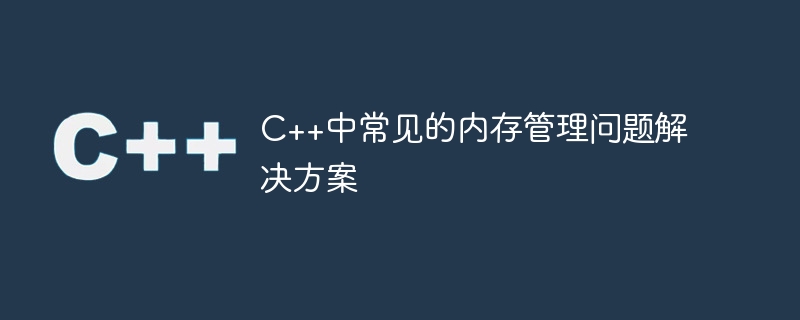Home >Backend Development >C++ >Solutions to common memory management problems in C++
Solutions to common memory management problems in C++
- 王林Original
- 2023-10-09 11:15:11935browse

Solutions to common memory management problems in C
Introduction:
Memory management is one of the important issues in the development process. In C, the programmer is responsible for allocating and freeing memory to ensure program stability and performance. However, since C does not have a garbage collection mechanism, memory management issues often become a headache for programmers. This article will introduce common memory management problems in C and give corresponding solutions, including specific code examples.
1. Memory leak
Memory leak refers to the problem that the program allocates memory space during operation but does not release it after use, resulting in the memory space being unable to be reused. This will cause the program's memory consumption to continue to increase, eventually causing the program to crash. The following is an example of a memory leak:
void allocateMemory(){
int* ptr = new int[100]; // 分配了一个整型数组
// 其他操作...
}Solution: Release the allocated memory in time to prevent memory leaks. For the above example, you need to use delete[] to release the memory after using the allocated memory:
void allocateMemory(){
int* ptr = new int[100];
// 其他操作...
delete[] ptr; // 释放内存
} 2. Dangling pointer
A dangling pointer means that the pointer variable points to a memory space that has been released. When a program attempts to access or modify memory through a dangling pointer, it can cause the program to crash. The following is an example of a dangling pointer:
int* getPtr(){
int data = 10;
return &data; // 返回局部变量的地址
}
void usePtr(){
int* ptr = getPtr();
*ptr = 100; // 使用悬空指针
}Solution: Set the pointer to a null pointer in time to avoid the generation of dangling pointers. For the above example, you can set the pointer to a null pointer at the end of the getPtr() function:
int* getPtr(){
int data = 10;
int* ptr = &data;
// 其他操作...
ptr = nullptr; // 将指针置为空指针
return ptr;
}
void usePtr(){
int* ptr = getPtr();
if(ptr != nullptr){
*ptr = 100; // 使用指针前先判断是否为空指针
}
} 3. Repeatedly releasing memory
Repeatedly releasing already released memory will cause the program to crash. The following is an example of repeatedly releasing memory:
void freeMemory(){
int* ptr = new int;
// 其他操作...
delete ptr;
// 其他操作...
delete ptr; // 重复释放内存
}Solution: After releasing the memory, set the pointer to a null pointer to avoid repeated release of memory. For the above example, you can set the pointer to a null pointer after releasing the memory:
void freeMemory(){
int* ptr = new int;
// 其他操作...
delete ptr;
ptr = nullptr; // 将指针置为空指针
// 其他操作...
if(ptr != nullptr){
delete ptr; // 再次释放内存前先判断是否为空指针
}
}4. Array out-of-bounds access
In C, array out-of-bounds access is a common programming error. This can cause unexpected behavior when the program is running, such as crashing or producing incorrect results. The following is an example of an array out-of-bounds access:
void accessArray(){
int arr[5] = {1, 2, 3, 4, 5};
for(int i=0; i<=5; i++){ // 越界访问
cout << arr[i] << endl;
}
}Solution: Make sure the array access does not go out of bounds. For the above example, you can change the loop condition to i
void accessArray(){
int arr[5] = {1, 2, 3, 4, 5};
for(int i=0; i<5; i++){ // 不越界访问
cout << arr[i] << endl;
}
}
Conclusion:
In C, memory management is an important issue. This article introduces common memory management problems in C, including memory leaks, dangling pointers, repeated memory release and array out-of-bounds access, and provides corresponding solutions, including specific code examples. Programmers should pay attention to memory management during development to ensure program stability and performance.
The above is the detailed content of Solutions to common memory management problems in C++. For more information, please follow other related articles on the PHP Chinese website!

